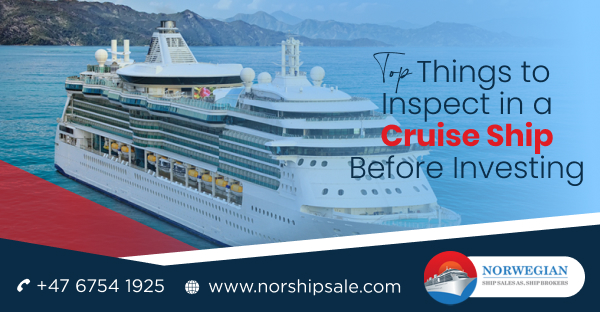Purchasing a cruise ship is a significant choice that needs serious thought and investigation. In order to be sure you’re making a wise investment, whether you’re going into the luxury cruise, adventure, or event charter business, you need to evaluate a cruise ship for sale. With an emphasis on helping you make wise choices when looking to buy a cruise ship, we will take you through all of the important factors to take into account and procedures to follow while examining a cruise ship in this in-depth guide.

Define Your Investment Goals
Establish your investing objectives precisely before beginning the examination procedure. Knowing your goals will help you determine the criteria for your inspection, whether you’re looking for event charters, luxury vacations, or adventure cruises.
Engage Professional Inspectors
Employ seasoned marine inspectors and surveyors with cruise ship expertise. Their knowledge will be very helpful in determining the state of the vessel, its compliance with rules, and any possible areas for development.
Documentation Review
Examine any pertinent data in detail, including any repair or accident history, ownership records, and maintenance logs. Make sure all of the ship’s documentation is up to date to prevent future legal issues.
Hull & Structure Inspection
Look for indications of rust, damage, or structural problems on the hull. A strong, well-maintained hull is essential to the longevity and safety of the ship.
Safety Features & Equipment
Make sure the cruise ship for sale has all of the most recent safety measures, such as emergency evacuation plans, fire suppression systems, and lifeboats. It is not negotiable to adhere to international safety standards.
Interior Spaces and Amenities
Examine the cabins, indoor areas, and facilities. Take into account the general state, hygiene, and visual attractiveness. A clean, appealing interior is necessary to keep customers happy.
Navigational and Communication Systems
Verify that the communication and navigation systems are up-to-date and functional. This is essential for both crew and passenger safety and for adhering to maritime laws.
Environmental Considerations
Evaluate the ship’s effect on the environment and its adherence to environmental laws. In the cruise business, environmentally friendly and sustainable methods are becoming more and more crucial.
Compliance with Regulations
Make sure that the cruise ship abides by all applicable national and international maritime laws. Serious operational and legal problems may arise from noncompliance.
Operational History & Reputation
Examine the ship’s reputation and operational history. Reputable companies and a strong track record are signs of a well-run and trustworthy ship.
Budget for Upgrades and Renovation
Think about how much future improvements and renovations would cost. Include these costs in your budget to make sure the cruise ship satisfies both your clients and your company’s needs.
Negotiate a Trial Period or Sea Trial
In order to evaluate the ship’s performance in different scenarios, work out a trial period or sea trial. This will provide important information about its capabilities and any possible problems.
Conclusion
In conclusion, careful examination and assessment are crucial if you’re thinking about buying a cruise ship. You may make an informed choice by outlining your objectives, hiring qualified inspectors, and carefully going over all of the features and documentation. In order to make a profitable investment in the ever-changing world of cruise ships for sale, don’t forget to take safety, compliance, and the vessel’s reputation into consideration.

